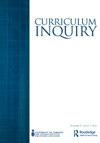保存巴勒斯坦:视觉档案,删除课程,以及后奥斯陆时期档案暴力中的反存档
IF 1.6
3区 教育学
Q2 EDUCATION & EDUCATIONAL RESEARCH
引用次数: 1
摘要
摘要本文告诉了奥斯陆后时期巴勒斯坦视觉档案的故事,特别是巴勒斯坦解放组织(巴解组织)的档案及其在20世纪90年代巴解组织离开突尼斯后的下落。它还讲述了巴勒斯坦广播公司在约旦河西岸和加沙的故事,以及在保存其视觉档案方面遇到的挑战。这篇文章认为,巴勒斯坦视觉档案的流离失所、丢失和扣押并不是因为它们对犹太复国主义构成的威胁。它强调,围绕档案的政治在定居者殖民主义、新自由主义、资产阶级国家利益在巴勒斯坦产生的新自由主义议程等更广泛的社会关系中,以及在巴勒斯坦政治派别之间的意识形态差异中,都是重叠的。然后,文章转向讨论档案暴力如何通过抹去和压制巴勒斯坦人的反殖民课程和史学来维持以色列霸权,以产生定居者国家的意识形态、公众记忆和国家形成的话语。这篇文章以巴勒斯坦为例,讲述了我们将其概念化为被抹去的课程的故事。尽管犹太复国主义无疑会造成课程上的抹杀和历史上的沉默,但我们强调,巴勒斯坦政治派别的既得利益,特别是在后奥斯陆时期,是如何助长档案暴力和沉默的。我们表明,尽管存在档案暴力,但个人和民间社会组织正在制定一种开垦政治,以追踪、保存、索赔和遣返巴勒斯坦档案,有效地实施了一种反档案形式。本文章由计算机程序翻译,如有差异,请以英文原文为准。
Preserving Palestine: Visual archives, erased curriculum, and counter-archiving amid archival violence in the post-Oslo period
Abstract This article tells the story of Palestinian visual archives in the post-Oslo period, specifically the archives of the Palestinian Liberation Organization (PLO) and their whereabouts following the PLO’s departure from Tunisia in the 1990s. It also narrates the story of the Palestinian Broadcasting Corporation (PBC) in the West Bank and Gaza and the challenges it encountered in preserving its visual archive. The article posits that the displacement, loss, and seizure of Palestinian visual archives did not result from the perceived threat they posed to Zionism alone. It underscores that the politics surrounding archives are imbricated in the broader social relations of settler colonialism, neoliberalism, and the neoliberal agendas that bourgeois national interests have produced in Palestine, as well as in the ideological differences between Palestinian political factions. The article then shifts to a discussion of the ways that archival violence maintains Israeli hegemony by erasing and silencing the anti-colonial curriculum and historiography of Palestinians to produce the settler state’s ideology, public memory, and discourses of state formation. The article uses Palestine as a case study to also tell the story of what we conceptualize as an erased curriculum. While Zionism undoubtedly produces both curricular erasures and historical silencing, we underscore how the vested interests of Palestinian political factions, specifically in the post-Oslo period, have contributed to archival violence and silencing as well. We show that despite archival violence, individuals and civil society organizations are enacting a politics of reclamation to trace, preserve, claim, and repatriate Palestinian archives, effectively practising a form of counter-archiving.
求助全文
通过发布文献求助,成功后即可免费获取论文全文。
去求助
来源期刊

Curriculum Inquiry
EDUCATION & EDUCATIONAL RESEARCH-
CiteScore
3.10
自引率
17.60%
发文量
37
期刊介绍:
Curriculum Inquiry is dedicated to the study of educational research, development, evaluation, and theory. This leading international journal brings together influential academics and researchers from a variety of disciplines around the world to provide expert commentary and lively debate. Articles explore important ideas, issues, trends, and problems in education, and each issue also includes provocative and critically analytical editorials covering topics such as curriculum development, educational policy, and teacher education.
 求助内容:
求助内容: 应助结果提醒方式:
应助结果提醒方式:


